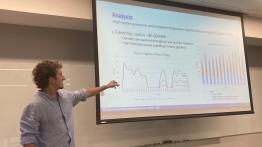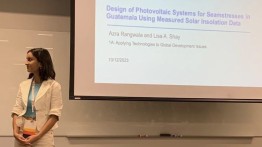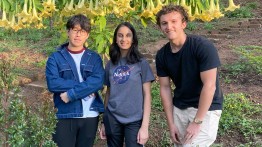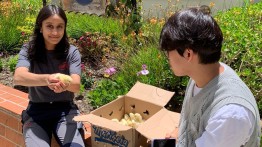Cooper Engineering Students Present at the IEEE Global Humanitarian Technology Conference
POSTED ON: October 30, 2023
Earlier this month, Azra Rangwala EE’25, Jacob Krebs CE’24, and Associate Dean Lisa Shay presented work at the IEEE Global Humanitarian Technology Conference at Villanova University outside Philadelphia. Rangwala and Krebs presented designs they had developed at the Barbara Ford Peacebuilding Center in Guatemala during the summer of 2022 as part of the Summer Study Abroad Program. Dean Shay presented designs on behalf of Seokwoo (Ryan) Chung ME’25 who also worked with the Barbara Ford Center in the summer of 2022.
Rangwala’s paper was entitled, “Design of Photovoltaic Systems for Seamstresses in Guatemala Using Measured Solar Insolation Data.” She served as a consultant to one of the Center’s entrepreneurship programs that taught women to make clothing using electric sewing machines. She designed an off-grid solar photovoltaic system to eliminate the high electricity cost of powering the sewing machines. Of her first experience of an engineering conference, Rangwala says “The experience strengthened my interest in engineering to help and to make a change. It made me feel that anything was possible and reminded me to keep searching for engineering opportunities that help the less fortunate.” She also notes that presenting to a wide-ranging audience tested her professional skills. “I found that public speaking skills were being put to utmost use during this conference. I had to present my paper [to] a room full of intelligent people whose experiences ranged from college students to CEOs of companies to Ph.D. graduates. So, I had to communicate my project in a way that a person with any experience could understand. I also had to be confident enough to get my ideas across to people who were much more experienced than me. Especially when it came to the panel, where broad questions were aimed at me and the other presenters. I developed my ability to think on the spot and provide an answer that brought my personal experience as a student who was part of a summer study abroad program to the table.”
Krebs' paper was entitled "Water Conservation and Rainwater Collection for Environmental and Economic Sustainability in Guatemala.” He served as a consultant to the Center itself, to help reduce water usage on their campus. “Throughout [my] two months in Guatemala, I learned how to listen to a client, analyze the feasibility of different designs, and how to ensure that my design was understood by the client. I saw that what the client really needed was to reduce the cost of irrigation.” Attending the conference was inspiring and uplifting. “Presenting at the GHTC, I was reminded how proud I was of the work I did in Guatemala and how much joy it gives me to bring a humanitarian perspective to engineering. I talked with other authors and researchers on how my findings could be applied to similar communities struggling with irrigation in Central America and Eastern Africa. I am delighted that my work can aid in the continuing humanitarian work that the IEEE community is completing year after year to help the most vulnerable communities.”
The Albert Nerken School of Engineering is grateful to Alan Fortier (ChE, ’79) for supporting student travel to present at engineering conferences and to the Victor and Eleanor DiFranco Endowed Fund and the E. Durbin & J. Morris Innovation Fund for underwriting the Dean’s Office Summer Abroad Cultural Immersion Fellowships.








